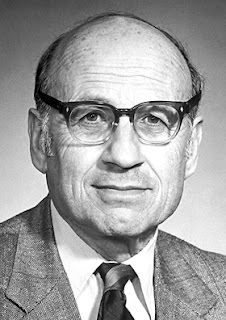 |
| Image Source: NobelPrize.org |
Topics: Chemistry, Computational Physics, Condensed Matter Physics, Density Function Theory*, Nobel Prize, Quantum Mechanics
“Why, man, he doth bestride the narrow world
Like a Colossus; and we petty men
Walk under his huge legs, and peep about
To find ourselves dishonourable graves.”
― William Shakespeare, Julius Caesar
LOS ANGELES (JTA) –Nobel Prize winner Walter Kohn, who fled Nazi-ruled Austria one month before the start of World War II, has died.
Kohn died on April 19 at his home in Santa Barbara. He was 93.
Kohn received the 1998 Nobel Prize in Chemistry, which he shared with British-born scientist John Pople. His research, which spanned the fields of physics and chemistry, applied quantum mechanics and advanced mathematics to explain complex chemical reactions.
His studies also formed the basis for the creation of innovative materials custom designed for medicines and for advances in electronics.
In the fall of 1939, Kohn left his native Vienna on one of the last transports of children to England, where he was interned as an “enemy alien.” The following year he was shipped to Canada, where he subsequently joined the Canadian army as an infantryman.
His parents, Salomon and Gittel Kohn, died in Auschwitz.
* Density functional theory (DFT) is a computational quantum mechanical modelling method used in physics, chemistry and materials science to investigate the electronic structure (principally the ground state) of many-body systems, in particular atoms, molecules, and the condensed phases. Using this theory, the properties of a many-electron system can be determined by using functionals, i.e. functions of another function, which in this case is the spatially dependent electron density. Hence the name density functional theory comes from the use of functionals of the electron density. DFT is among the most popular and versatile methods available in condensed-matter physics, computational physics, and computational chemistry. Wikipedia
Jewish Telegraphic Agency: Walter Kohn, Nobel Prize winner in chemistry, dies at 93
"Walter Kohn - Facts". Nobelprize.org. Nobel Media AB 2014. Web. 4 May 2016. < http://www.nobelprize.org/nobel_prizes/chemistry/laureates/1998/kohn-facts.html >
"Walter Kohn - Biographical". Nobelprize.org. Nobel Media AB 2014. Web. 4 May 2016. < http://www.nobelprize.org/nobel_prizes/chemistry/laureates/1998/kohn-bio.html >
Comments